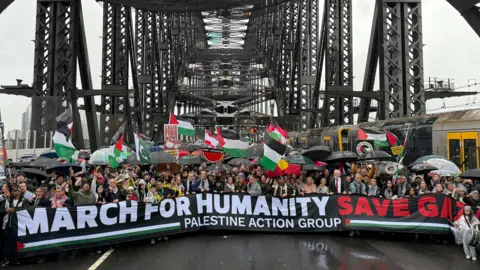On a rainy Sunday in Sydney, tens of thousands of protesters gathered for a significant pro-Palestine demonstration known as the March for Humanity. Despite facing torrential downpours, the turnout highlighted the urgency and passion surrounding the ongoing conflict, particularly the humanitarian crisis in Gaza. This march was notable for its historical implications, especially given that it was authorized by the Supreme Court just one day prior, a development that organizers hailed as a historic win for their cause.
The iconic Sydney Harbour Bridge, often a focal point for public assemblies, was once again transformed into a platform for voices demanding change. Protesters braved the weather, carrying placards with messages urging politicians to intervene and stop the war. Notable figures joined the crowd, including WikiLeaks founder Julian Assange, federal MP Ed Husic, and former New South Wales Premier Bob Carr. These figures lent gravitas to a demonstration that extended beyond mere expression of dissent and aimed at mobilizing political action.
Chants echoing through the rain-soaked streets underscored the protesters’ demands. “Shame shame Israel, shame shame USA,” they shouted, with collective calls for a ceasefire that resonated throughout the area. Families, many with young children in tow, participated in the peaceful demonstration, which was monitored by police officers ready to ensure safety amidst the crowd. Protesters taken aback by the overwhelming community support were intent on expressing solidarity with those suffering in Gaza, demonstrating a powerful connection that transcended geographical boundaries.
Participants expressed varied personal motives for their commitment to the protest. Alec Beville, a father of a three-year-old, shared his thoughts on the plight of children in Gaza, drawing parallels to his own child’s experience, questioning the adequacy of Australia’s humanitarian response to the ongoing suffering. Alongside him, Zara Williams, clad in a sling holding her baby Avery, criticized the Australian government for its perceived inaction, emphasizing the need to speak out against the imposed hardships faced by the Palestinian population.
However, just two hours into the march, a text from New South Wales Police instructed participants to cease movement due to safety concerns and await further instructions. Protesters were directed to turn back towards the city in an organized manner, a request that was likely fueled by the police’s prior concerns that had initially led them to reject the march’s application.
The Palestine Action Group, the organization behind the march, had lodged their intentions to protest in light of what they deem the ongoing “atrocity” in Gaza. Initially, their application was rejected on account of inadequate time to prepare a traffic management plan, with the police highlighting potential dangers, including crowd crush risks. However, a dramatic turn of events unfolded when the New South Wales Supreme Court ultimately sided with the organizers just hours before the march.
Justice Belinda Rigg acknowledged the legitimate concerns for public safety but emphasized the necessity for urgent action regarding the humanitarian crisis in Gaza. This final-hour authorization granted attendees protection under the Summary Offences Act, allowing them to advocate freely without the risk of arrest for obstructing traffic—a critical decision in the context of civil protest rights.
While the protest was welcomed by many, it faced criticism, particularly from groups like the NSW Jewish Board of Deputies, who expressed disappointment over the courthouse’s decision to authorize the demonstration. Meanwhile, global pressure on Australia to recognize Palestinian statehood has intensified, with notable countries like France and Canada indicating their intent to do so under specific conditions at the upcoming United Nations General Assembly.
The pro-Palestine march in Sydney not only reflects local activism but is also emblematic of a broader international discourse around the Israel-Gaza conflict. Prime Minister Anthony Albanese’s comments on the matter indicate a cautious approach, emphasizing the importance of securing peace for Israel before acknowledging Palestinian statehood—a stance that aligns with the current Australian government’s foreign policy considerations.
In summary, the March for Humanity served as a significant moment in Sydney, echoing the sentiments of many who feel a responsibility to respond to the humanitarian crisis unfolding in Gaza. This event has drawn attention not only to local political discourse but has also added to the global conversation regarding recognition and support for Palestinian rights.












